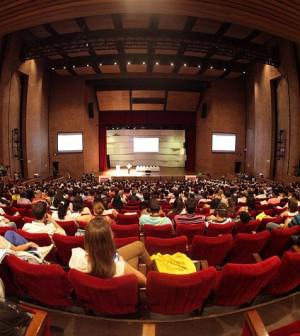
The Seventh World Urban Forum (WUF7) took place in Medellin, Colombia, from 5 – 11 April 2014. The United Nations Human Settlements Programme (UN-Habitat) organises this event every two years in a different city to discuss issues concerning human settlements, including rapid urbanisation and its impact on cities, communities, economies, climate change and policies.
With the presence of 22.000 people at this seventh session of the World Urban Forum, records were broken. Under the gaze of representatives of governments, private sector, international organisations, academics, professionals and civil society, a new collaboration was created.
The aim of the collaboration is "to facilitate the flow of knowledge and financial resources necessary to help cities become more resilient to disruptions related to climate change, disasters caused by natural hazars, and other systemic shocks and stresses, including the socio-economic challenges associated with rapid urbanization. "
Participants of the Seventh World Urban Forum underlined the need to promote a new urban agenda that conquers the challenges of that that cities and governments are faced with and the lack of framework and planning, which leads to serious problems. Suggested is that the new urban agenda should:
- Encourage governments to develop and use methods, such as national urban plans and policies, that link current urban
development with future needs, and that are solidly grounded in the fundamental principles of equity, justice and human rights;
- Advance greater social cohesion and break down social divides, promoting equity through empowering all segments of society,
particularly women, youth and indigenous peoples.
- Promote participatory and inclusive local governance that empowers all inhabitants.
- Promote sustainable urban development, based on urban planning that promotes youth participation, gender equality,
balanced territorial development; strengthened resilience to climate change and natural disasters; the upgrading and prevention of slums;
and provision of housing, basic services and land tenure security; access to safe, affordable, accessible, and sustainable transport;
and access to safe public spaces and services for all.
- Promote active and committed participation of the private sector, civil society, including grassroots communities, and other constituencies
through partnerships to ensure broad-based economic and social development, in order to reduce poverty and create jobs for all.
Overall, the Forum contributed to the sustainable urbanization in the Post 15 Development Agenda, as the participants highlighted the key aspects of sustainable cities and human settlements, as that it contributed to the Habitat III that is seen as an opportunity to develop such new urban agenda, and to the participants who have themselves influence on equitable urban development. Participants of the World Urban Forum reaffirmed their commitment to integrate urban equity into the development agenda in the WUF7 Medellín Declaration.
